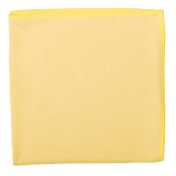In the last few posts, we first got an overview of detergents and in the second part of our blog series, we will look at the basic types of detergent. In addition to these three detergents, i.e. detergents for heavy-duty laundry, color detergents and delicate detergents, there are also countless special detergents and washing additives for certain textiles. Today, in the third part of the blog series, we will look at some special detergents and washing additives.
Wool detergent for the fluff and sports detergent for sweaty laundry
Wool and silk are two materials that are rather sensitive and require special treatment. It is therefore recommended that you use a detergent for wool and silk for these items of clothing. These special detergents do not contain enzymes . The enzymes serve to break down proteins, which would damage the fibers in wool. If you do not have any wool detergent to hand, you can also use a delicate detergent. There are now also special detergents for sports clothing. Very sweaty clothing can smell unpleasant; sports detergent is intended to remedy this. Sports detergent is comparable to a delicate detergent, but it contains an additive to neutralize odors . Outdoor and functional clothing absorb odors easily.
Bright white curtains and black clothes
Curtains also need to be washed from time to time, especially if they are hanging near the kitchen or in a smoker's household. After a long time, white curtains can turn yellow or grey. To get sparkling white curtains again, special curtain detergent can be helpful , as these contain bleach to counteract discolouration. There is also a special detergent to prevent dark and black items of clothing from fading, unlike white curtains. These have colour and fibre protection so that the colours remain intense.
A sustainable alternative – soap nuts and washing eggs
In addition to liquid and powder detergents, pods and discs, there are soap nuts , which have been used for washing for many, many years. On the other hand, the innovative washing egg has been developed , which also offers an environmentally friendly alternative to "normal" detergent. Soap nuts are a pure and untreated natural product and are the fruit of the soap nut tree. The soap nut contains 15% detergent-active substances and is put into the washing drum in a small bag. There are various advantages and disadvantages for and against soap nuts. A major advantage is that no chemicals are used, making it particularly suitable for allergy sufferers. The sustainable aspect also outweighs the disadvantages. The only disadvantage is that stubborn stains cannot be removed because the washing power is not sufficient. In addition, soap nuts are more suitable for soft water because the natural product does not contain any water softener. In addition, soap nuts are not suitable for white textiles, as they turn grey very quickly.
The innovative washing egg
A more recent development is the washing egg. This is not a natural product, but is also an environmentally friendly alternative to conventional detergent . The washing egg is filled with washing balls that are free of aggressive chemicals and clean the laundry naturally. The egg is simply added to the laundry and can then be used again. The washing effect develops between 15°C and 60°C and is effective for up to 144 washes .
What detergent additives are there?
There are a number of laundry additives on the market that make laundry softer or give it a fresh scent. Fabric softener is one of the most common laundry additives used by almost everyone who wants soft laundry. Fabric softener is almost essential, especially for soft towels. In addition to the soft wash result, the laundry also usually has a fresh scent . Fabric softener should not be used for microfiber and most synthetic fabrics. In addition to fabric softener, hygiene rinse can also be added to the wash cycle. Hygiene rinse has a disinfecting effect and is intended to remove viruses, fungi and bacteria from clothing. It can also prevent unpleasant odors . The hygiene rinse gives the laundry a hygienic freshness. Laundry scents can be used to give the laundry a long-lasting scent. Various laundry scents are suitable for this, available both in liquid form and as pearls. Both variants can be added to the laundry. These promise a long-lasting scent.
washcloths for different types of laundry
Another laundry additive are small cloths that can be added to the laundry with different effects. Firstly, there are cloths that are designed to absorb colour and dirt . This means that new items of clothing do not rub off on others and items of clothing are also protected from greying. This means that laundry does not have to be separated. Secondly, there are cloths that are suitable for black and white laundry. Cloths for white laundry give clothes a brilliant white and free them from grey haze and yellowing . Cloths for black laundry counteract faded clothing and even smooth out roughened fibres. Last but not least, there are also dryer sheets. These not only give the laundry a refreshing scent, but also ensure that the laundry is wrinkle-free, does not build up static and retains its freshness through drying.
To be continued with part 4 of our blog series
Now we have explained all detergents and washing alternatives in more detail. As you can see, there are countless options on the market for washing laundry. In the next part we have some cleaning tips for you. We will explain how to dose detergent correctly and what the washing symbols mean. Cleaning the washing machine is also important so that the laundry stays hygienically clean, so we will also explain how it can best be cleaned.



